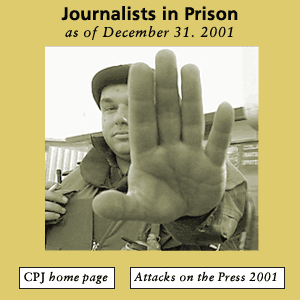Attacks on the Press 2001: Middle East Analysis
Bucking a worldwide trend toward democracy in the post-Cold War era, the political landscape of the Middle East and North Africa remained dominated by an assortment of military-backed regimes, police states, autocracies, and oligarchies. A new, younger generation of leaders has emerged in some countries in recent years, inheriting power and bringing hope for political…
Attacks on the Press 2001: Algeria
Algeria’s boisterous press has been at odds with president Abdel Aziz Bouteflika since he took office in 1999. In 2001, the animosity took a more serious turn when the government promulgated harsh new press legislation. In June, despite intense local and international protest, the Algerian Parliament approved a series of new amendments to the Penal…

Attacks on the Press 2001: Journalists in Prison
There were 118 journalists in prison around the world at the end of 2001 who were jailed for practicing their profession. The number is up significantly from the previous year, when 81 journalists were in jail, and represents a return to the level of 1998, when 118 were also imprisoned.
Journalists facing prosecution for defaming military
Your Excellency: The Committee to Protect Journalists is alarmed that independent Algerian journalists are facing criminal prosecution for defaming the military under restrictive new laws passed in June 2001. During a February 25 court hearing, the Ministry of National Defense charged Selima Tlemcani, a journalist for the French-language daily Al-Watan, under the new law with defaming the army. In a December 11 article, Tlemcani had accused the military police of financial misconduct.
Journalist sentenced in absentia on defamation charge
New York, July 25, 2001 — The Committee to Protect Journalists is troubled by the recent trial and sentencing of Algerian journalist Faouzia Ababsa, managing editor of the French-language daily L’Authentique, on defamation charges. On July 11, Ababsa was convicted in absentia of defaming Abdelkarim Mahmoudi, president of the Confederation of Finance Managers, a private…
TWO JOURNALISTS KILLED IN ANTI-GOVERNMENT DEMONSTRATIONS
New York, June 19, 2001 — Two Algerian journalists were killed last Thursday, June 14, while covering mass anti-government protests organized by Berber community leaders in the capital Algiers, CPJ has learned. Fadila Nejma, a reporter for the Arabic weekly Echourouk, died after being struck by a speeding bus during the protests. Nejma suffered severe…
Deputies Pass Harsh Criminal Defamation Law
New York, May 18, 2001 — The Committee to Protect Journalists (CPJ) expressed deep concern about the Algerian Parliament’s recent approval of new legislation that stiffens criminal penalties for defamation. On May 16, according to local news reports, the lower house of Parliament—the National People’s Assembly—approved new amendments to the Algerian Penal Code that prescribe…
Parliament to vote on strengthening criminal defamation penalties
Honorable Members of Parliament: The Committee to Protect Journalists (CPJ), a non-governmental organization of journalists devoted to upholding press freedom worldwide, is concerned about draft Penal Code amendments, now under discussion in Parliament, that would substantially increase criminal penalties for defamation.